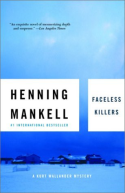 Book description:
Book description:
It was a senselessly violent crime: on a cold night in a remote Swedish farmhouse an elderly farmer is bludgeoned to death, and his wife is left to die with a noose around her neck. And as if this didn’t present enough problems for the Ystad police Inspector Kurt Wallander, the dying woman’s last word is “foreign,” leaving the police the one tangible clue they have—and in the process, the match that could inflame Sweden’s already smoldering anti-immigrant sentiments.
Unlike the situation with his ex-wife, his estranged daughter, or the beautiful but married young prosecuter who has piqued his interest, in this case, Wallander finds a problem he can handle. He quickly becomes obsessed with solving the crime before the already tense situation explodes, but soon comes to realize that it will require all his reserves of energy and dedication to solve.
Review:
I reckon that most people would think, quite reasonably, that a mystery with a name like Faceless Killers would be riveting. Unfortunately, those people would be wrong.
I’d been aware of the acclaim that some Scandinavian crime fiction has garnered in recent years, and the Wallander series seemed the most visible—not saying it’s the best of the lot, but there is that Kenneth Branagh series on the BBC—so I decided to start there, and with the first book in the series.
It’s January 1990 when a seventy-year-old man wakes in the night, sure he’s heard something amiss at his neighbor’s house. He’s right—the couple inside has been brutally murdered, and the wife’s dying words (as well as one particular detail about the crime) suggest involvement by one or more of the many foreign refugees flooding into Sweden. Wallander and his team investigate.
I like to think I could’ve pegged this for a first book in a series even if I hadn’t known. There’s just so much to give that away. Wallander has a set of stereotypical “detective issues,” for one, including a drinking problem, an estranged wife and daughter, a crazy parent, and a thoroughly random obsession for opera. (Perhaps the specificity of “opera” isn’t quite a stereotype, but I have definitely encountered several detectives who randomly groove to classical music while on the job.) The vast majority of the policemen in the background are utterly indistinguishable from one another, with the exception of one guy who might not be around in subsequent installments. Wallander’s personal issues miraculously resolve themselves off-camera in a fast-forward that happens towards the end of the book. Occasionally, characters engage in pointless debates/rants about immigration policy. And after much plodding around, the case is ultimately solved thanks to the conveniently (and implausibly) amazing memory of one witness.
It took me ages to get through the first half of the book, but things did pick up a little bit towards the end. Wallander’s transformation into someone more positive doesn’t feel earned, as it mostly happens during that fast-forwarded period, but it does make him a character that I’d have more interest in revisiting. Until the point he got over the wife and made up with the daughter and father, I was pretty sure I would not be coming back, but if he can shed at least some of the clichéd personal baggage, there may be hope.




Speak Your Mind